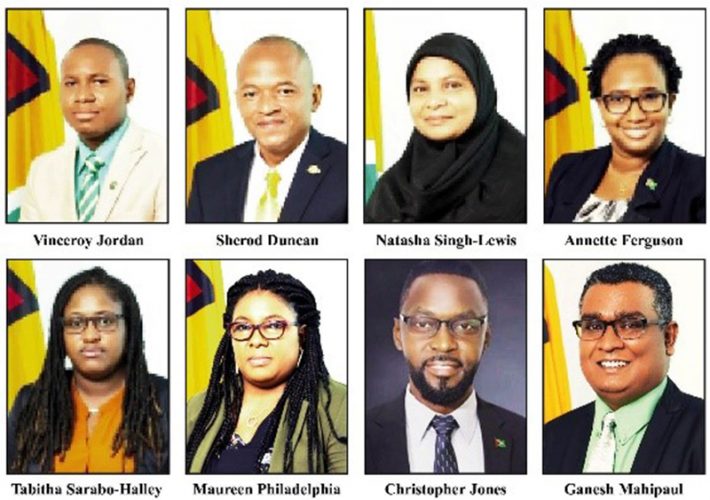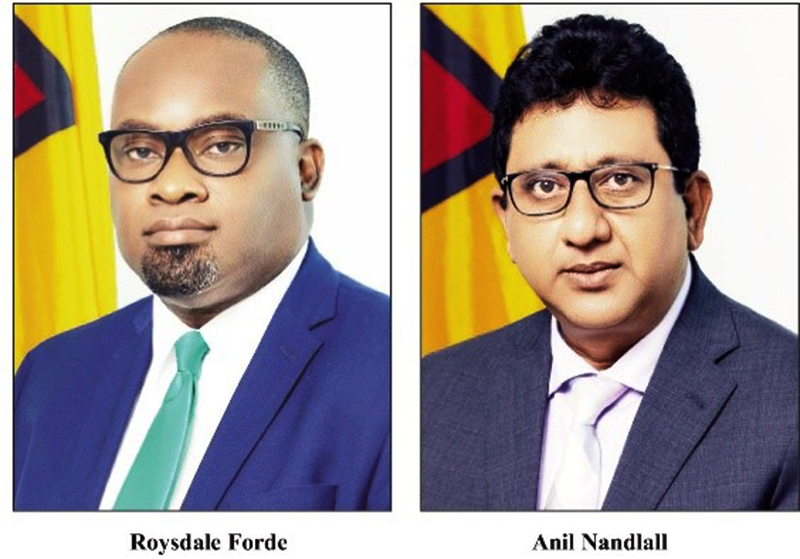The Court’s jurisdiction to intervene in the internal affairs of Parliament was hotly debated on Friday morning when arguments in the case of the eight Members of Parliament (MPs) suspended by the Assembly’s Committee of Privileges were heard by the High Court.
Attorney General Anil Nandlall SC was resolute that Parliament, as a sovereign entity, is accorded “absolute and exclusive” privilege which allows it to run its own affairs, free from outside interference.
Senior Counsel Roysdale Forde, who represents the suspended MPs, however contended that having not been afforded their constitutional right of being heard, the suspended MPs have a related right to approach the court for redress.
 Moreover, he argued that Parliament has no power to suspend.
Moreover, he argued that Parliament has no power to suspend.
In calling for the matter to be thrown out, Nandlall contended that the standard of parliamentary privilege by which the House is governed, gives it exclusive jurisdiction over the discipline of its members without review.
He said that the Assembly’s Standing Orders—which are the rules governing it—are what regulates its internal affairs, while adding that Article 165 of the Constitution speaks of the sovereign nature of the House.
The AG vehemently argued that parliamentary violations cannot be viewed under the same jurisdiction as the court adjudicates over violations of the law, unless a violation in Parliament, would also have amounted to a law being violated.
Only then, he argued, would a Court be able to intervene although he stressed that that was not the nature of the case filed by the MPs.
Forde, in his arguments, advanced, however, that because the natural justice right of the MPs to being afforded a fair hearing before being suspended had contravened the Constitution in Article 144, it allows for the court’s intervention.
He submitted that Article 153 of the Constitution gives the court jurisdiction to enquire into a breach of any constitutional right.
Forde’s position is that in the face of a complaint of a breach of any constitutional right by a citizen, the court’s jurisdiction is “immediately triggered.”
To Forde’s argument of Parliament having no powers to suspend, the Attorney General (AG) cited a number of case law authorities in a bid to illustrate that this is a practice of Parliaments in the Commonwealth and further afield.
But more specific to Guyana, he said that that is a function of the Privileges Committee, while noting that, “when it comes to the discipline of its members that is a domain for Parliament.” “Disciplinary measures of Parliament is exclusively for Parliament,” he went on to stress.
Nandlall’s position was that subject to the privileges and immunities enjoyed by MPs, there is no place in the National Assembly for the constitutional rights such as those alluded to by Forde. Those he said, reside outside of the Parliament.
Echoing the sentiments of the AG was attorney Chandraprakash Satram, who represents the other two Respondents, Speaker and Clerk of the National Assembly Manzoor Nadir and Sherlock Isaacs, respectively.
Satram submitted that in accordance with Article 172 (2) of the Constitution, a Court cannot enquire into a report of any of the committees of parliament. He said that to therefore go behind such a report and invalidate the finding of a committee of the National Assembly is obviously not allowed.
Forde in challenging this view, however, said that Article 172 does not apply to his clients’ claim, as it is not seeking to question anything related to “words spoken, or written” as is the requirement in that Article.
Article 172 provides, “No civil or criminal proceedings may be instituted against any member of the Assembly for words spoken before, or written in a report to, the Assembly or to a committee thereof or by reason of any matter or thing brought by him or her therein by petition, bill, resolution, motion or otherwise.”
Forde expressed the view that his clients are simply being “punished” by the Privileges Committee of the National Assembly.
Nandlall’s resolve was that the only provision “allegedly” breached as Forde contends, is Article 144 (8) which deals with a fair hearing. The AG sought to stress, however, that that provision has no application before the Privileges Committee of the Parliament.
His unyielding position is that the Court cannot intervene in the internal matters of the National Assembly, while stating, “And so, if the Court ever penetrates that veil, that is the last day of the Separation of Powers.”
He then finally submitted that the Court has no jurisdiction to hear the case brought by the suspended MPs, while asking that it be thrown out.
Following the almost two-hours of arguments, Justice Damone Younge said that she will now consider the submissions and on December 8 will deliver her ruling on whether or not she has jurisdiction to hear the substantive claim.
Background
On July 28th, the suspended Parliamentarians Christopher Jones, Ganesh Mahipaul, Sherod Duncan, Natasha Singh-Lewis, Annette Ferguson, Vinceroy Jordan, Tabitha Sarabo-Halley and Maureen Philadelphia received their letters of suspension from the National Assembly informing them that they would not be receiving their salaries and other benefits during that period.
A week prior, the House voted to suspend Jones, Mahipaul, Duncan and Singh-Lewis for four consecutive sittings while Ferguson, Jordan, Sarabo-Halley and Philadelphia were suspended for six consecutive sittings. Their suspension came as a result of the failed bid on December 29th, 2021, to obstruct the passage of the Natural Resource Fund bill.
On that chaotic night, APNU+AFC parliamentarians were scattered throughout the parliamentary chamber chanting “no thieving bill must pass,” while blowing whistles and banging on the tables.
The Speaker tried, unsuccessfully, to restore order to the House.
In the end, MP Ferguson grabbed the ceremonial mace and made a dash for the door but was tackled by the Sergeant-at-Arms and another parliamentary security officer. At this time other Opposition MPs rushed to her aid even as Singh was still on the floor making his presentation.
Minister of Parliamentary Affairs and Governance Gail Teixeira later moved a motion to refer the eight MPs to the Committee of Privileges. The Committee’s report, which recommended the suspension, was tabled in Parliament on July 21st and adopted around 1:30 am on July 22nd after the APNU+AFC MPs left the chambers.
The withholding of salaries from the suspended MPs can last months since the National Assembly meets quite infrequently.
The suspended MPs are asking the court to declare that the report of the Committee of Privileges on the Privilege Motion dated January 24, 2022, is unconstitutional, null, void and of no legal effect.
They are also asking the court to determine that the report breached the principles of natural justice since they were not guaranteed their rights prescribed under Article 144 (8) of the Constitution.
In their FDA, the MPs had filed a Notice seeking, among other things, an injunction staying their suspension.
The Court has said that it will first consider the issue of jurisdiction before going on to consider the grant of any interim relief.









